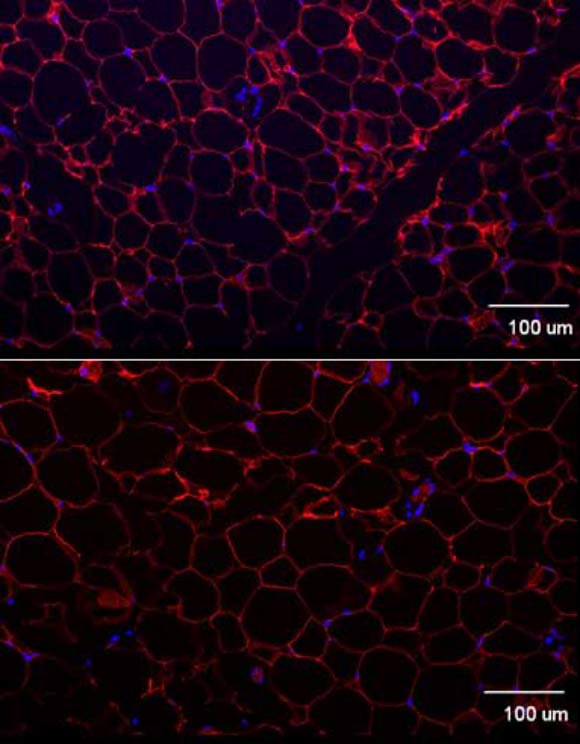An international team of scientists, led by Dr Gareth Lim and Dr James Johnson from the University of British Columbia, has discovered a gene that could be an important cause of obesity.

When the scientists silenced the ‘obesity gene’ in mice, it resulted in a 50% reduction in the amount of white fat (top vs. bottom image). Image credit: Gareth Lim.
According to the scientists, the gene, which encodes a protein called 14-3-3zeta, is found in every cell of the body.
But when they silenced the gene in mice, it resulted in a 50% reduction in the amount of unhealthy ‘white fat,’ which is associated with obesity, heart disease and diabetes.
The fat reduction occurred despite the mice consuming the same amount of food. Mice that were bred to have higher levels of the 14-3-3zeta protein were noticeably bigger and rounder, having an average of 22% more white fat when fed a high calorie diet.
“Until now, we didn’t know how this gene affected obesity. This study shows how fundamental research can address major health problems and open up new avenues for drug discovery,” said Dr Johnson, who is the senior author of a paper published in the journal Nature Communications.
Earlier this year, a consortium of scientists found over 100 regions on the human genome that correlate with obesity, likely through regulating the brain’s perception of hunger and the distribution of fat throughout the body.
That study, however, did not identify the gene that encodes 14-3-3zeta, which controls the production of fat cells – known as adipogenesis – and the growth of those cells.
Discovery of this direct link between a protein and fat production points the way to a possible drug therapy.
Dr Lim, Dr Johnson and their colleagues from Canada, Australia, and Germany, theorize that by suppressing the gene or blocking the 14-3-3zeta protein, they could prevent fat accumulation in people who are overweight, or are on their way to becoming so.
“People gain fat in two ways – through the multiplication of their fat cells, and through the expansion of individual fat cells. This protein affects both the number of cells and how big they are, by playing a role in the growth cycle of these cells,” Dr Lim said.
_____
Gareth E. Lim et al. 2015. 14-3-3zeta coordinates adipogenesis of visceral fat. Nature Communications 6, article number: 7671; doi: 10.1038/ncomms8671







